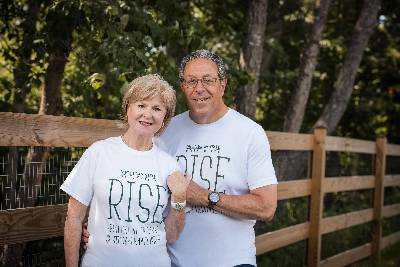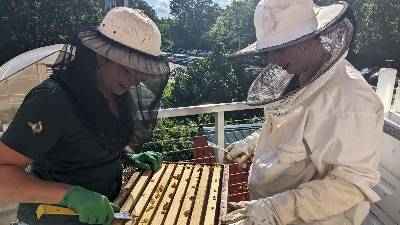$1.1M alumni gift to support student development in sustainability, environmental studies as part of RISE program
Article Highlights
- Michigan State University has received a gift of $1.1M from alumni Gary and Sue Farha in support of MSU’s Residential Initiative on the Study of the Environment, or RISE, program in the College of Natural Science.
- RISE is an interdisciplinary living-learning program with a focus on sustainability and environmental studies that provides students with the skills and knowledge to become the next generation of leaders for a sustainable future.
- The Farhas have established two funds: #1: $1M endowment, the Farha Family “Go Green” Scholarship in the R.I.S.E. program which will provide opportunities for students to pursue their passion in the field of environmental studies and sustainability.
- #2: $100,000 expendable fund, the Farha Family “Go Green” Student Travel Fund which can be used to send students to conferences.
Michigan State University has received a gift of $1.1 million from alumni Gary and Sue Farha in support of MSU’s Residential Initiative on the Study of the Environment, or RISE, program in the College of Natural Science.

Sue and Gary Farha, both alumni of Michigan State University’s Eli Broad College of Business, have established two funds. The first is a $1 million endowment, the Farha Family “Go Green” Scholarship in the Residential Initiative on the Study of the Environment. The second gift is a $100,000 expendable fund, the Farha Family “Go Green” Student Travel Fund. Credit: Charles King, C King Media, LLC
RISE is an interdisciplinary living-learning program with a focus on sustainability and environmental studies that provides students with the skills and knowledge to become the next generation of leaders for a sustainable future.
The Eli Broad College of Business alumni have established two funds. The first is a $1 million endowment, the Farha Family “Go Green” Scholarship in the Residential Initiative for the Study of the Environment. The second gift is a $100,000 expendable fund, the Farha Family “Go Green” Student Travel Fund.
“We are grateful to the Farhas for their leadership and vision in supporting the success of students who are passionate about the environment,” said Interim President Teresa K. Woodruff, Ph.D. “Their generosity will help aspiring leaders majoring in any of MSU’s many disciplines graduate ready to contribute to solutions that will advance a more sustainable future in the communities and industries they will serve.”
“Gary has always been committed to the development of young people, particularly in his field of renewable energy and sustainability,” said Sue, who earned her Master of Business Administration from MSU in 1982. “By establishing this scholarship fund at MSU, we can provide opportunities for students to pursue their passion in this field and contribute to the exciting challenges that lie ahead.”
“We also wanted to find a way to get students exposed to ‘real life’ situations,” said Gary, who also received his MBA in 1982. “The expendable fund can be used to send students to conferences, where they can be exposed to professionals who work in the areas of sustainability and begin networking. We hope this creates excitement for them to get involved in the field after they graduate.”
When the Farhas learned about the RISE program, they knew that’s where they wanted to invest their resources.
“The work we do in my company is very cross-disciplinary, involving the areas of finance, sustainability, facilities, and procurement,” said Gary, who established his own business in 2010 – initially named Customer First Renewables, now known as Coho Climate Advisors – after a 19-year career serving energy and industrial companies at McKinsey & Company. Likewise, the RISE program appeals to students from a wide variety of fields across campus.
“This generous gift from Gary and Sue Farha sends a critically important message to our students that we need and support future leaders for a sustainable future,” said Laurie Thorp, RISE director. “I look forward to awarding our emerging leaders in RISE with financial support for their education in all disciplines that intersect with climate science and environmental sustainability.”

(L to R): Anna Heck (MSU Extension) and Abigail Snelling (zoology) perform a hive check on the Bailey Bees as part of RISE experiential learning rotations in their first year. As Bee Team members, students learn the importance of pollinators and the challenges they face, including habitat loss, disease, parasites and environmental contaminants. Credit: Johrie Beadle
“Sustainability is a focus area in the College of Natural Science, and we are deeply appreciative of this leadership gift from Gary and Sue Farha to the RISE program,” said College of Natural Science Dean Phil Duxbury. “This gift will enrich the experiences of many RISE students who live, learn and work as an interdisciplinary residential cohort that emphasizes sustainability in myriad contexts.”
In response to why it’s important for him and Sue to give bac to MSU, Gary explained it this way.
“MSU kept showing up in my life in different ways,” he said, citing four touch points.
First, MSU accepted him into the MBA program and offered him a research assistantship in marketing, which helped him pay for his schooling. Second, he met Sue in a study group while at MSU; they were married in 1985. Third, he was offered an opportunity to join the Broad College of Business advisory board in 2004, where he served two terms. Finally, MSU was his company’s first client in 2011; Farha’s company also advised on MSU’s solar car port projects on campus.
“That was the fourth time that MSU influenced my life,” Gary said. “They were investing in me and believing in me, which meant a lot.”
He went on to explain how his parents’ work ethic and entrepreneurship (they owned and operated a grocery store in Wichita, Kansas) ignited his own entrepreneurial spirit.
While working at Danaher Corp. in 2009, Gary felt compelled to get back into the energy industry – where he had begun his career – and start his own company.
“I started developing a belief that there was some major change afoot in the energy industry, driven by a desire for lower carbon sources of energy that were going to become increasingly cost competitive with traditional forms of energy,” Gary said. “I also felt that large organizations, universities and corporations were going to take matters into their own hands, rather than rely on the utility to solve their desire for lower carbon sources. Our belief was we could help these large organizations contract directly for large-scale, grid-based solutions.”
Over the years, Coho has served many universities and large corporations in the United States, including McDonald’s, Wells-Fargo and Corning, Inc. They now serve more than 80 clients worldwide with a team of 70 employees. In February 2023, Coho was acquired by London-based ERM, “the largest global pure play sustainability consultancy.” Gary will remain as a partner in the firm.
“It’s interesting how you can start out with a kernel of an idea,” Gary said. “If you get someone to believe in it – in my case, that was MSU initially – it can lead to some exciting and life-changing ways to have an impact on clients, colleagues, and the environment.”Banner image: Michigan State University RISE students volunteer in the Bailey GREENhouse every Friday as a way to build community and learn about sustainable food and farming through direct experience. Credit: Johrie Beadle